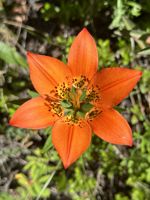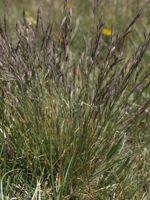Mon-Fri 9am - 5pm Mountain time
Wood Lily vs Rocky Mountain Fescue
Lilium philadelphicum
Festuca saximontana
CUSTOM GROW
CUSTOM GROW
Wood Lily is a native perennial wildflower known for its vibrant, trumpet-shaped blooms in shades of orange to red. Its showy flowers appear mid-summer and are highly visible in meadows and prairies. The upward-facing flowers are an important nectar source for many pollinators, including native bees, butterflies, and hummingbirds.
Unlike most lilies, the Wood Lily’s flowers face upward rather than nodding. It is slow to establish and may take years before flowering, but once mature, it requires little maintenance. It is well-suited for pollinator gardens, naturalisation projects, prairie restoration, and open woodland plantings.
Wood Lily is the provincial flower of Saskatchewan and North America’s most widespread lily. Despite its wide natural range, populations have been declining. Habitat loss, overgrazing by deer, and unsustainable picking have reduced both its abundance and density across many regions. These pressures highlight the importance of protecting and restoring this once-common wildflower.
Rocky Mountain Fescue is a native perennial bunchgrass recognized for its fine-textured clumps and adaptability to harsh environments. It grows well in dry, rocky, and nutrient-poor soils and is highly cold-tolerant, making it well-suited to both prairie and alpine habitats. Its fibrous root system contributes to soil stability and helps reduce erosion on slopes and shallow soils.
Widespread across western and northern North America, Rocky Mountain Fescue is an important component of many prairie and alpine ecosystems. It contributes ground cover and organic matter that support soil function, provides cover for small wildlife, and offers moderate forage for grazing animals. Hardy and versatile, it is used in ecological restoration, naturalization, and habitat enhancement projects, particularly in upland and alpine landscapes.
Wood Lily Quick Facts
Rocky Mountain Fescue Quick Facts
Toxicity: toxic to cats

